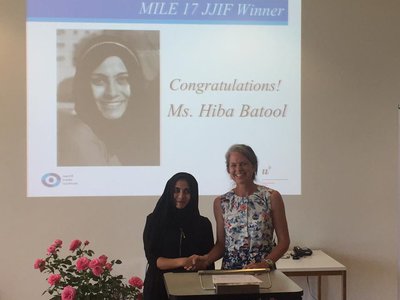21 Mar 2018
MILE graduate: scholarships enabled me to pursue an unpaid internship
Hiba Batool, a graduate of the 2017 MILE master’s programme, was the first recipient of two new WTI scholarships: the John Jackson Internship award (JJIF) and the World Bank Geneva Internship Programme award. She gave us this interview on completion of her six-month internship at the International Trade Centre, ITC, in Geneva.
What did it mean to you to be awarded the two scholarships?
I was delighted and extremely thankful to receive support from the John H. Jackson Internship Fund (JJIF) and the World Bank Geneva Internship Programme. Most of all, I feel fortunate to be the first recipient of two scholarships that are geared to empower MILE graduates to acquire experience in cross-cutting fields such as international trade and investment. In addition to invaluable mentorship from Dr Lee Ann Jackson and Professor Pierre Sauvé, the scholarships were a central element in my ability to pursue an unpaid internship in an international organisation, assisting with living expenses in Geneva. Clearly, the scholarships took me one step further in the pursuit of my career goals.
Apart from the funds, did you receive any other assistance from the scholarship providers and do they follow your progress?
Yes. I have been privileged to receive guidance from both Dr Jackson and Prof Sauvé. Since my graduation in June 2017, we have established channels of communication and maintained regular contact. Dr Jackson and Prof. Sauvé have been generous with their time, devoting energies to monitor my professional progress and to have inspiring trade-related discussions about current challenges and opportunities in the field. These discussions have invariably increased my awareness of central issues and favoured solution-based approaches, which, in turn, I have attempted to share with colleagues at ITC.
Tell us about the internship you did at ITC.
I worked in the Chief Economist and Export Strategy office at ITC. It was an amazing learning experience under the supervision of Ms Olga Solleder and Ms Marion Jansen. I was responsible for the management, processing, and visualisation of statistical data. My responsibilities also included performing econometric analysis for the ITC’s annual flagship report, the SME Competitiveness Outlook (SMECO). More specifically, I concentrated on drafting one of the chapters in the SMECO 2018, which focuses on the effect of business ecosystem 4.0 on SME competitiveness. I was also involved in the operationalisation of the SME Competitiveness Survey. Finally, I also contributed to ITC’s reports on promoting SME competitiveness in Kenya and Indonesia as part of ITC’s own SheTrades initiative.
What key things have you learned in the past six months?
To begin with, I have learned that producing an official report is a multi-faceted endeavour that is premised on close-knit team cooperation. Effectively, the production of such documents is a chain, with each team member’s input being intertwined with the others’. Collaborating as part of a small group in an effort to generate a voluminous number of empirical observations required (and by the same token, taught me the significance of) efficiency, timeliness, and detail-orientation. That task also required me to adapt my writing skills in such a way as to use terms comprehensible to non-technical but trade-familiar audiences. From a personal viewpoint, working with a culturally and professionally diverse team was an extremely enriching experience. Among other things, that experience revealed the power of open-mindedness and adaptation as a means of finding mutually beneficial solutions to any minor differences that might emerge.
What are your plans after the internship?
I have been fortunate to receive a consultant contract from the ITC. Since March 2018, I have been working as Trade Analyst as part of the same team at ITC.
For details of scholarships awarded at the WTI, see the MILE and TRAIL+ pages of the WTI website.
Further info


